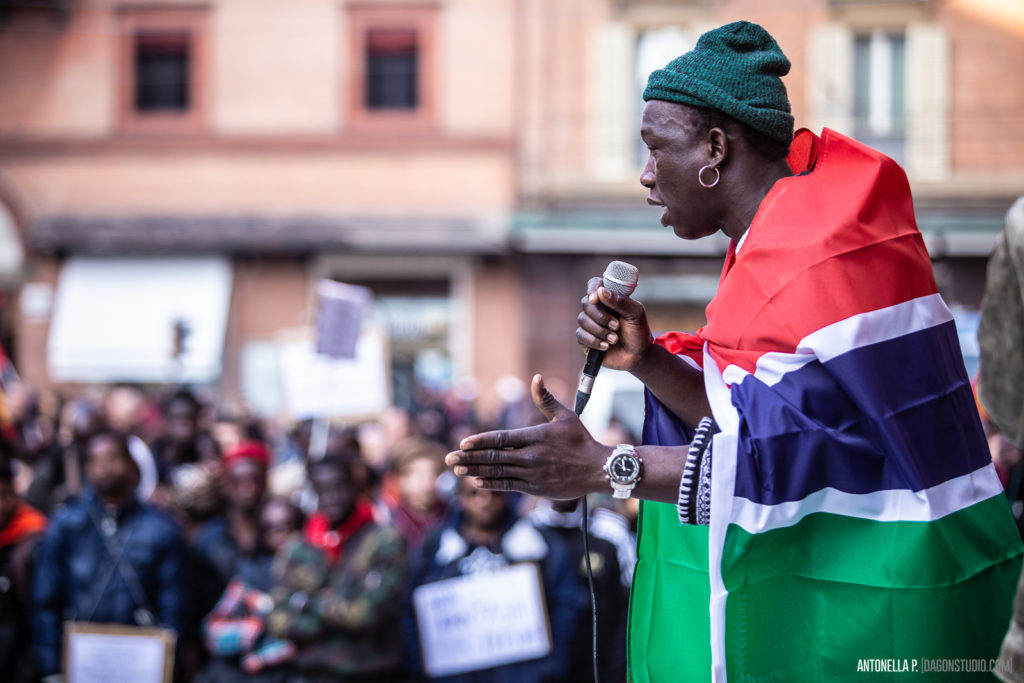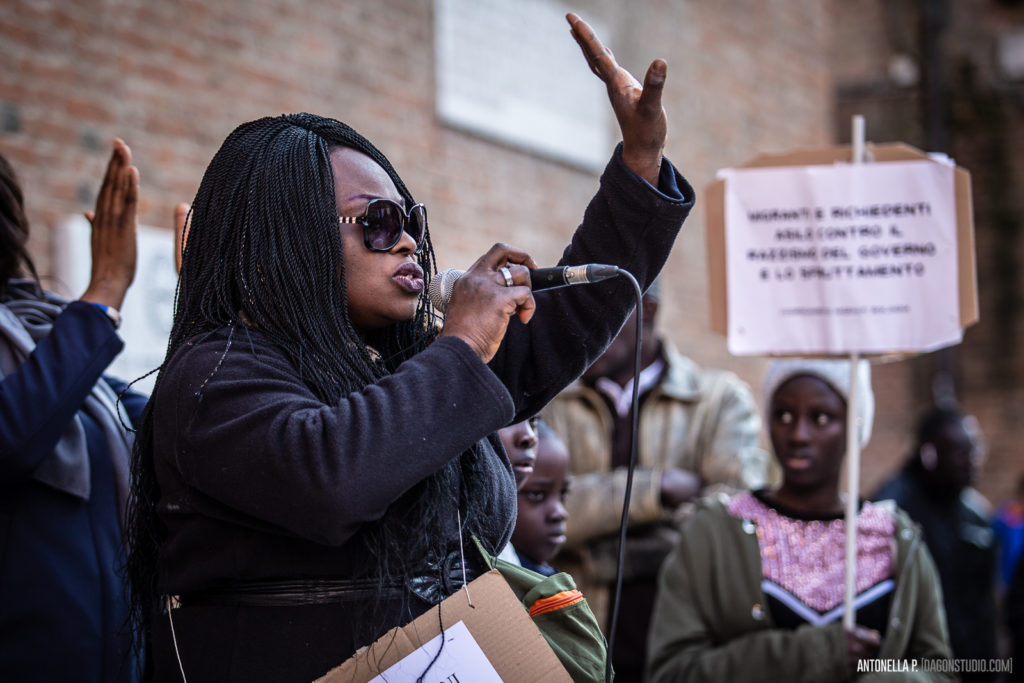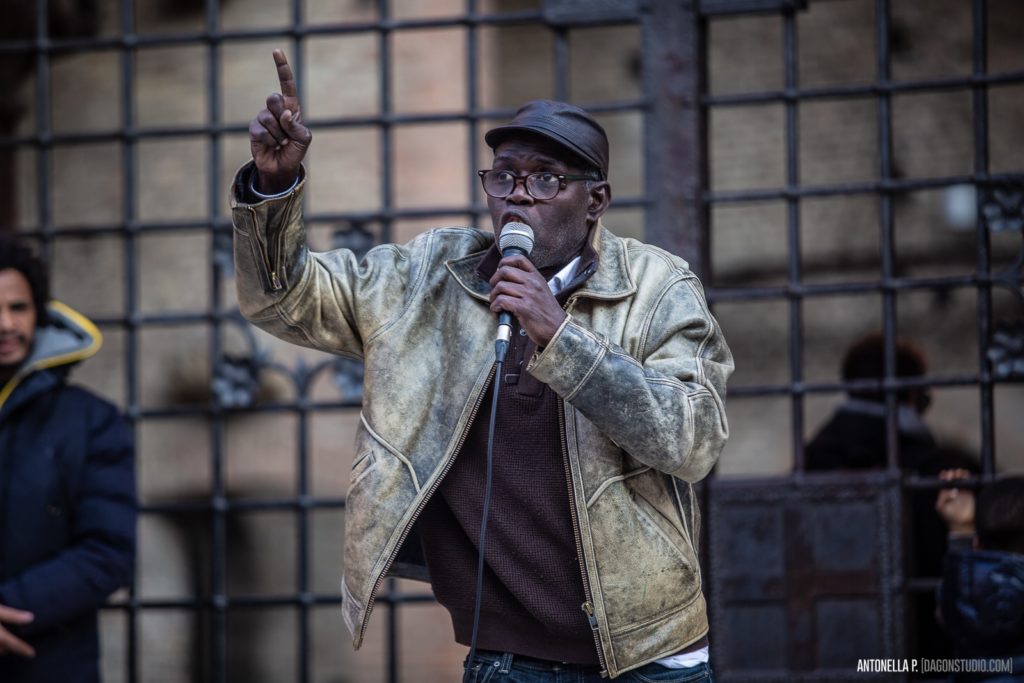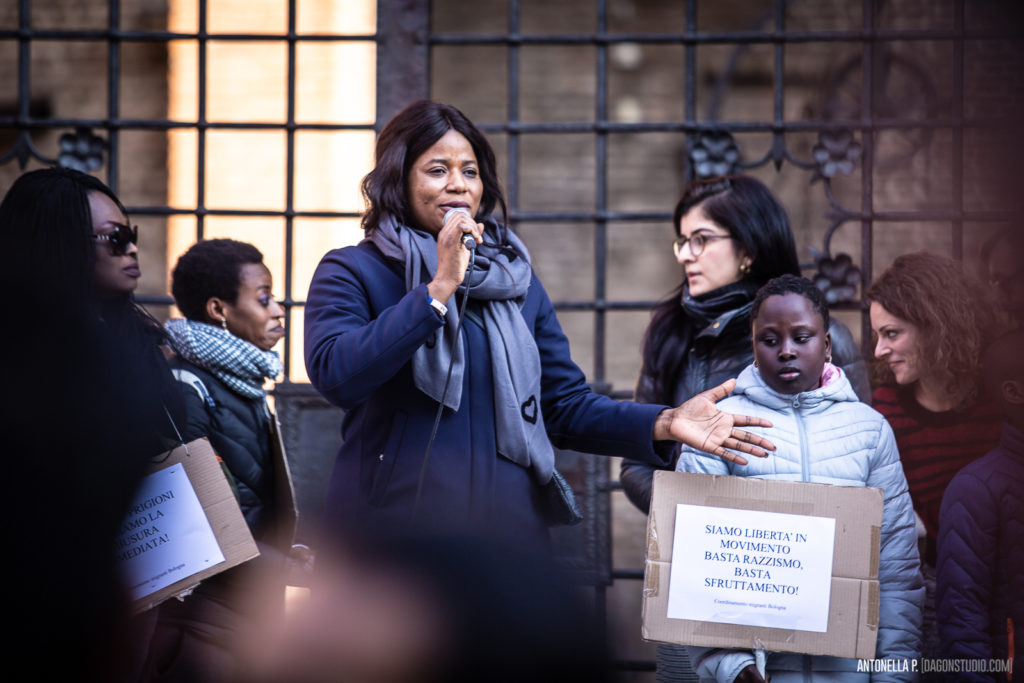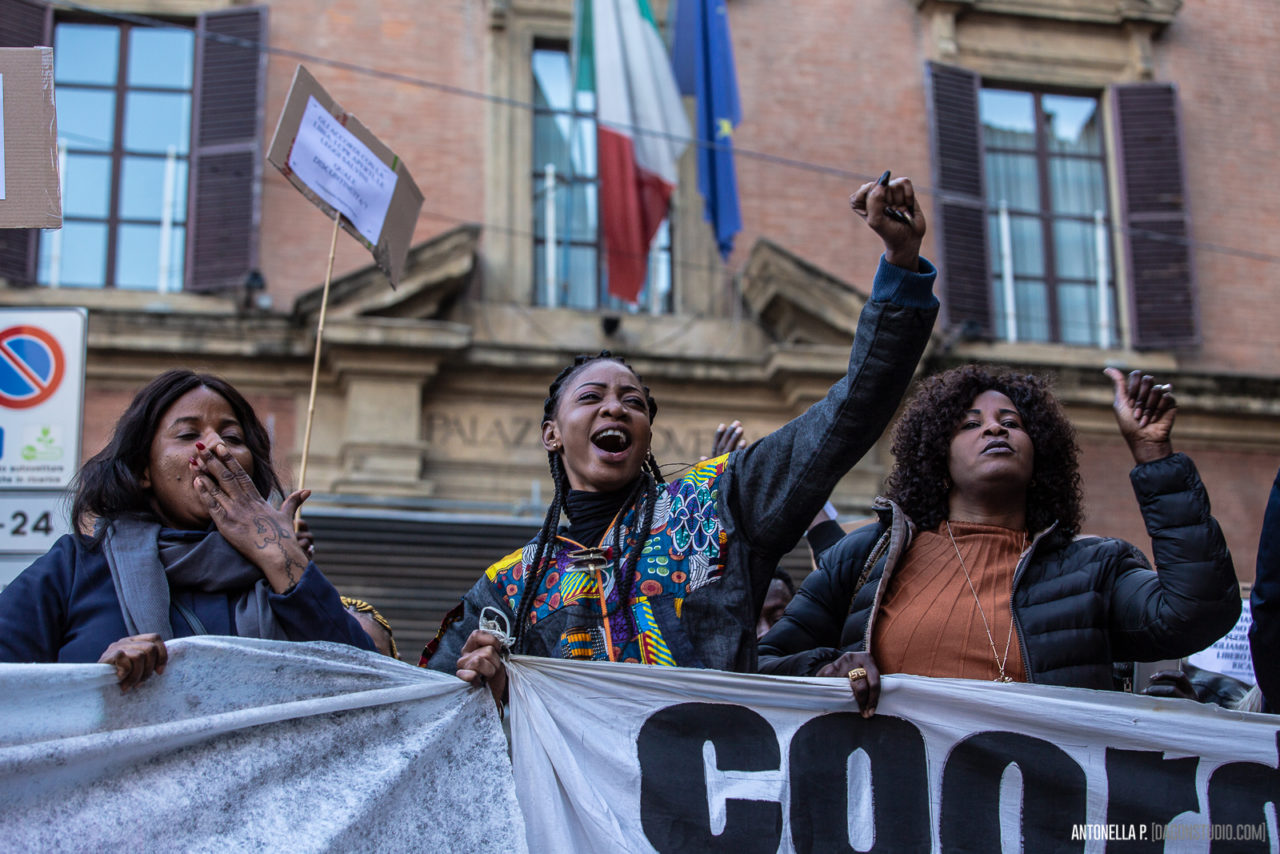
All photography by Antonella Pappalardo (dagonstudio.com)
Italy’s biggest populist is on trial for migrant kidnapping – but his legacy is still ruining lives
Far-right leader Matteo Salvini faces trial for his persecution of migrants. But activists say his popularity is rising – and his legacy has made life impossible.
Alice Figes
05 Mar 2020
Last month, the Italian Senate lifted the political immunity of the country’s most infamous far-right leader, Matteo Salvini. Months earlier, Matteo had been serving in the very same Senate before a new coalition government forced him into opposition. In February, the Senate voted overwhelmingly not to shield Matteo from potential prosecution for his treatment of people seeking refuge in Italy, including one particular case involving the refusal to allow 116 people from Libya to land in Italy in July 2019. For this, Matteo stands accused of “migrant kidnapping”.
But Matteo’s poisonous legacy reaches far beyond a single incident. A “Security Decree”, nicknamed the “Salvini Decree” and introduced in Autumn 2018, abolished Italy’s two–year humanitarian residency permit for asylum seekers. Simultaneously, it also stripped migrant communities in Italy of their right to receive further humanitarian aid. The conditions the act has created has made life for these communities even more untenable and precarious. Because of this, migrant activists from Il Coordinamento Migranti recently gathered at a demonstration in the northern city of Bologna to protest the impact of the Salvini Decree.
The activist group has has been in operation for the last 15 years and describes itself as a collective of migrants and Italians under the slogan of “il protagonismo dei migranti” (“migrant-led movement”). It seeks to resist the increasing normalisation of anti-migrant and racist sentiment and to expose the socio-economic impacts of the Salvini Decree, demanding the creation of an EU humanitarian and residency permit for migrants. Speaking to gal-dem at the demonstration, activists painted a picture of being trapped in a vicious cycle of racism, labour exploitation and forced homelessness.
“I did not know I was coming to Italy. I was fleeing to save my life,” explains 38-year-old Aminata, an asylum seeker from Sierra Leone and mother of two young children. She arrived in Italy in 2008 and is a member of Il Coordinamento Migranti.
“I have been in Bologna for ten years now. I thought it was a very beautiful city when I first arrived and there was a lot of understanding among the inhabitants. But things started to change after the Matteo decrees were introduced and the war in Libya. Migrants were blocked and left to die at sea.
“But something else changed too. Since Matteo’s laws, I’ve started to see that there really are some wicked people… I ran away from the war, to not get killed. Yet I come here and now I’m fighting to live all over again”.
Aminata came to Italy when asylum seekers could still access the two-year humanitarian permit, but the introduction of the draconian 2018 Salvini Decree saw a severe crackdown on migration. Arrival rates dropped dramatically; in 2019, there were only 11,500 recorded newcomers, compared to 181,000 in 2016 – a decrease of 169,500 people in just three years.
The migrant crisis in Italy
According to UNHCR data, up to 15,000 people have also been reported “dead or missing” since the beginning of the humanitarian crisis. While Matteo stands to be prosecuted for a single incident of refusing to let a rescue vessel land with asylum seekers on board, at least 25 other standoffs between ships carrying saved migrants, and coastguards allegedly took place during his time in government. Matteo – a loud Eurosceptic –repeatedly declared that the people being held on the ship couldn’t step foot onto Italian land until “Europe steps in to help”, and insisted on other EU member states accepting the asylum seekers.
Although Matteo now potentially faces jail for his policies, campaigners fear that any trial will be nothing more than a farce, and could whip up even more support for the far-right in the country. According to the latest national opinion polls, Matteo currently commands over 30% of the popular vote – and attempts to prosecute him are only pushing his approval rate higher.
It’s unlikely he’ll be found guilty either; the chief prosecutor of the Cantania court, where the case would be heard, is rumoured to be a sympathiser of the fascist Northern League party, in which Matteo holds the post of secretary. Plus, the whole process could take up to five years. “In the short–term, it is very likely Matteo will profit from the accusation, with at least a plurality of Italian electors agreeing with him on his immigration policy,” says Carlo Carlo Guarnieri, a political scientist from Bologna University.
For migrant communities, the entire spectacle is yet to hold any significance. It’s why they’ve come out to Piazza Maggiore on a chilly Saturday with banners and flags, to lobby for the abolition of Matteo’s Security Decree and the introduction of a humanitarian permit for people across the EU. Real progress is needed, they say, not the spectacle of a show trial.
“It is important that Matteo lost on this topic, but what will actually change?’ says Aminata. “Things always stay the same. We want a politician to come and give us actual change, that gives a residence permit to those who don’t have it.
“When you’re granted asylum, you get the document, but nobody helps you, you leave, you go and you have to face the world. You don’t understand the country, you don’t speak the language yet, you don’t know how to approach people. However much you try to be your best, to be a normal somebody, it’s like you’re still a prisoner”.
Exploitative work
The Salvini decree further exacerbated damage done by the punitive Bossi-Fini immigration laws which were introduced in the early 2000s. The Bossi-Fini laws restrict the access of current migrants to residency permits. Without fixed work and confronted with Italy’s labyrinthine bureaucratic system, this law makes seeking residency, welfare support and housing in Italy impossible. The combination of racial discrimination and a labour market characterised by high long-term unemployment levels mean migrants are effectively locked out of social integration in a cycle tantamount to blackmail.
Labour exploitation is only set to get worse. Italy currently has a 9.9% unemployment rate. Previously many young Italians left the country for the UK or Germany to find opportunities. But after Brexit, with no visas for “low–skilled workers”, labour competition is predicted to increase as swathes of young people return to Italy looking for jobs.
In Bologna, the vast majority of migrant communities are from North African, South Asian and Middle Eastern countries such as Pakistan, Syria, Tunisia and Libya. Employers are notorious for mistreating workers from these regions, as they face barriers to reporting abuse and seeking justice when they face workplace exploitation. Bologna’s central freight village, the Interporto, depends on migrant workers to distribute and transport products to shops but migrant workers employed there receive on-call jobs, (“contratto a chiamata”) for a pittance, or illegal ‘piecework’ jobs like picking olives, paid cash in hand. They have little choice; if they refuse to take the job it might mean another night sleeping rough, either on the street, at the train station or in the park.
“Contratto a chiamata” is potentially even more extreme and exploitative than the UK’s nearest equivalent of zero-hour contracts. Employers know full well that migrant workers cannot afford to turn down the job, let alone choose their hours. Their other options are to beg on the street, sell woven bracelets, lighters or packs of tissue to people drinking outside bars and “locali”. But for those who move to Italy, enough is enough.
“We are here today to give a signal to this government,” says Babacar at the demonstration. He’s an activist originally from Senegal, who has lived in Italy for the last 30 years and now works in Bologna’s migrant welcome centres. “We are [here to] demonstrate especially for those who have arrived here seeking asylum,” he continues, addressing the 200-strong crowd.
All labourers deserve dignity and fair play in their work, argue the Coordinamento. “Our jobs are exhausting and unsafe but we are still asked to skip breaks and work faster,” says Babacar. “We work in places that make money off of our skin but pay us only a few euros an hour. We have timetables that do not allow us to have a life, we don’t even have holidays to visit our relatives. Every year we are forced to renew our residency permits and spend money doing so. We are not here to steal jobs. We contribute to the economy of this city.”
“They hire Italians, but as a black man, I’m only given on–call work”
Young migrants are especially struggling under Italy’s hostile environment. Three years ago, 21-year-old Abdul escaped from Guinea to save his life. “I ran away and when I arrived here, I entered without knowing that I was in Italy,” he explains. “I have always respected the rules, I went to school, I got my driving license, I attended compulsory courses that they told me to do, I studied the mechanisms of the system and while studying I also work at the interport of Bologna. But I haven’t managed to get a fixed contract. I have an occasional job for a few hours. They hire Italians, but as a black man, I’m only given on-call work”.
Abdul, like many others, has been unable to secure housing. He sleeps at the migrant welcome centres or at friends’ houses. Italy’s homelessness has massively increased, tripling after the 2008 economic crisis. In 2017, 5.1 million people were living in “absolute poverty”’, with 40% finding themselves having to survive on the streets for more than four years. This isn’t taking into account the numbers of hidden homeless, like Abdul. Despite this, Italian right-wing papers continue to pit the Italians against migrant communities, pointing to the diminishing rates of migrant homelessness compared to that of white Italians, while disregarding the reality, including the large swathe of hidden homeless.
Women in resistance
A significant proportion of the Coordinamento’s membership are also women. “We are not here to create problems, it is our right to be here,” says Chumi, a migrant activist originally from Sierra Leone. “In our hearts, there is suffering, especially we women who have to raise our children because we have no opportunity to live better.
“The mother who knows she has to bring her kids to school doesn’t feel good about leaving them where they will be treated as foreigners’ children. We must help the many mothers who are alone, without husbands to support us. Who defends us? Nobody. You are left alone, like a dog. Laws for single mothers must be made. Laws to combat violence against women”.
While a coalition of the Democratic Party (PD) and the right-wing Five Star Movement currently govern Italy, the legacy of the Matteo decrees is still intact, with even “leftist“ politicians complying. “The political direction of the current government is not changing,”’ says Michele Cento from Il Coordinamento Migranti di Bologna, speaking at the demonstration. “The current Interior Minister has made so many promises, yet nothing has been done. The struggles of migrants have not been at the centre of politics”.
“Estimates suggest there will be 143 million displaced persons by 2050. In response, nationalist politicians are witnessing a boom in support”
Bonaccini, the PD candidate running for re-election last month in Bologna remained reticent on migration, aware of the huge boost in support for anti-migrant parties on the right. He declared the region “a land of hospitality”. Yet that appears only true for tourists or international students at the university. The Coordinamento’s demand for a EU humanitarian residency permit would take away the connection between permits and labour contracts, permitting EU freedom of movement and a broader definition of “humanitarian aid”, although what that consists of in the modern era is a question that will increasingly test national and international governments in the next 50 years.
In addition to the existing migrant crisis, estimates suggest there will be 143 million displaced persons by 2050, a number exacerbated by the effects of climate change. In response, nationalist and populist politicians are witnessing a boom in support, closing borders and normalising latent racist sentiments. Hate speech is on the increase in Italy; a recent survey found that 1 in 4 voters for the Democratic Party expressed disbelief in the Holocaust. Meanwhile, Giorgia Meloni’s pro–Mussolini, neofascist party “The Brothers of Italy”, in alliance with Matteo’s Northern League, is seeing a surge in support.
On stage at the demonstration, Babacar invited the crowd to take a macro-historical perspective. “West and Central Africa are countries colonised by Europeans,” he said. “The English and French colonised Africa and took everything away from it: oil, gas and other natural resources, keeping these countries in poverty and debt… As long as there is colonisation, people will always run away”.

